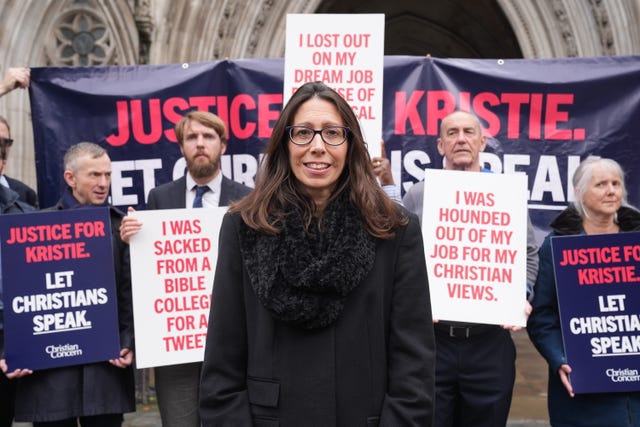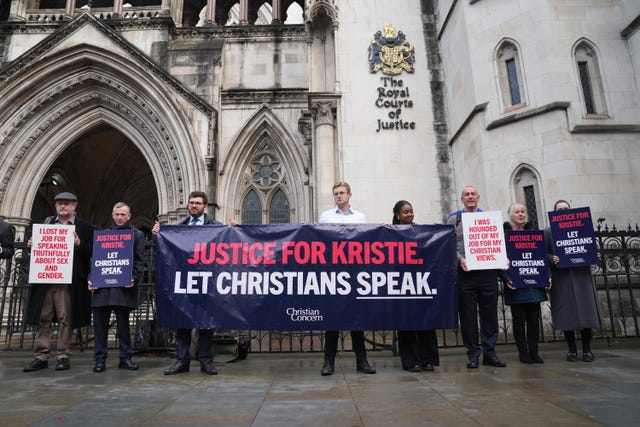A Christian school worker had her free speech rights “violated” and faced “direct discrimination” when she was dismissed over sharing social media posts about LGBT+ relationships teaching, the Court of Appeal has been told.
Lawyers for Kristie Higgs, 47, claim she lost her role at Farmor’s School in Fairford, Gloucestershire, in 2019 because of the “unlawful stereotyping” of her beliefs over “gender and sexual ethics” as “homophobic and transphobic”.
The 47-year-old mother-of-two, from Fairford, who worked as a pastoral administrator and work experience manager, was fired after sharing Facebook posts criticising plans to teach LGBT+ relationships in primary schools.
On Wednesday, her lawyers asked senior judges to uphold her claim against the school over alleged unlawful discrimination, in the latest stage of her years-long legal battle.
The school has previously denied dismissing Mrs Higgs because of her religious beliefs and said she was sacked because of the language used in the posts.
Ahead of the hearing, her supporters prayed outside court and held up placards carrying messages claiming they had lost jobs for expressing their views.
Mrs Higgs told reporters: “My posts reflect biblical true Christian teaching on gender and sexuality.
She added: “This is not just about me. It cannot be right that so many Christians are losing their jobs or facing discipline for sharing biblical truth our Christian beliefs.”
Mrs Higgs shared and commented on posts which raised concerns about relationship education at her son’s Church of England primary school.

Pupils were to learn about the No Outsiders In Our School programme, which is a series of books teaching the Equality Act in primary schools.
Mrs Higgs, who posted on a private page under her maiden name, shared two posts in October 2018 to about 100 friends.
One of the posts referred to “brainwashing our children”.
An anonymous complaint was made to the school and Mrs Higgs was suspended and, after a disciplinary hearing, dismissed for gross misconduct.
At Wednesday’s hearing in London, her lawyers appealed against a June 2023 Employment Appeal Tribunal (EAT) judgment, which ruled in her favour and sent the case back to an employment tribunal for a fresh decision.
Richard O’Dair, for Mrs Higgs, told judges in written arguments that, despite having “won” at the EAT, it was “unnecessary” to remit the case.
Mr O’Dair said the EAT had provided “highly unsatisfactory guidance” which meant there was a risk Mrs Higgs “will be denied justice once again”.
Her posts were “political speech contributing to the ongoing debate on a matter of public interest” and “a manifestation of her religious beliefs”, judges were told.
There was “overwhelming evidence” that Mrs Higgs was “discriminated against her on the grounds of her beliefs”, Mr O’Dair said, adding that the school’s alleged interference with her rights under the the European Convention on Human Rights was “not prescribed by law”.
“It must follow that the (the school) violated (Mrs Higgs’s) convention rights and that her claim must succeed,” he added.
Mr O’Dair said that the person who complained was “guilty of unlawful stereotyping and therefore of discrimination” and the school had “adopted the discriminatory views of that third party”.
He added: “Nothing in the posts amounted to an expression of homophobia or transphobia in the sense of animus to people because of protected characteristics. Making that assumption was stereotyping and therefore directly discriminatory.”
He added that Mrs Higgs had worked with LGBT pupils and “there had never been any suggestion that she discriminated against them”.
Protecting the school’s reputation and the rights of others provided “no justification” for her “extremely severe” dismissal, the court was told, and Mr O’Dair said there were “extremely speculative and nebulous concerns” about how people might misinterpret her posts and perceive the school.
If the school had concerns about the perception of the posts’ “florid and provocative language”, it could have asked Mrs Higgs to clarify her views in a further post or to be more careful in the future, her lawyer said.

In a 2020 ruling, an employment tribunal concluded that Mrs Higgs’s religion is a “protected characteristic” as defined by the Equality Act, but the school lawfully dismissed her.
Sean Jones KC, for the school, said in written submissions that it accepted “fuller reasons” were needed from the tribunal and that remitting the case was “the appropriate course”.
He said the school accepted the Facebook posts were “manifestations” of Mrs Higgs’s beliefs, some of which were legally protectable.
“However, the posts might equally be read as manifestations of homophobic or transphobic beliefs which would not be protectable,” Mr Jones said.
He continued: “(Mrs Higgs) was not dismissed for manifesting (her beliefs) but because the manner in which it was manifested could reasonably have caused and did cause others to think she was expressing homophobic or transphobic views.”
Mrs Higgs’s case is being supported by the Christian Legal Centre, and the court also gave permission for the Association of Christian Teachers, the Free Speech Union, Sex Matters, the Church of England Archbishops’ Council and the Equality and Human Rights Commission (EHRC) to intervene.
Baroness Kishwer Falkner, chairwoman of the EHRC, which is neutral on the appeal, said separately from the hearing that the equalities watchdog was providing “impartial expert advice” over the interpretation of the Equality Act and Human Rights Act.
She said: “We expect this landmark case will set a precedent for future cases concerning protected beliefs in the workplace, especially where those beliefs intersect with other protected characteristics.
“This case is also significant because it will help establish how employers can respond, without discriminating, to what appears to be an increasingly common phenomenon: a third-party complaint where an employee has published their personal views on a social media platform.”
The appeal, before Lord Justice Underhill, Lord Justice Bean and Lady Justice Falk, is expected to conclude on Thursday, and a judgment is expected in writing at a later date.




Comments: Our rules
We want our comments to be a lively and valuable part of our community - a place where readers can debate and engage with the most important local issues. The ability to comment on our stories is a privilege, not a right, however, and that privilege may be withdrawn if it is abused or misused.
Please report any comments that break our rules.
Read the rules hereComments are closed on this article